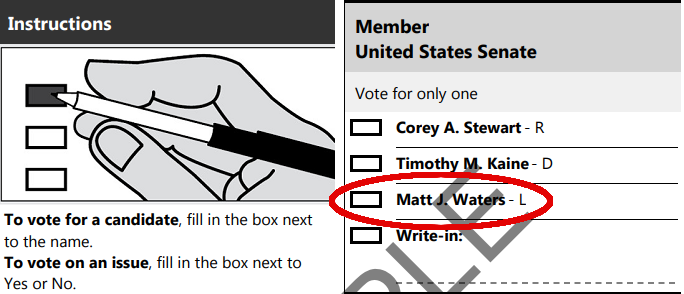
a Libertarian was on the ballot in the 2018 race for the US Senate
Source: Prince William County, Sample Ballot (November 6, 2018)

a Libertarian was on the ballot in the 2018 race for the US Senate
Source: Prince William County, Sample Ballot (November 6, 2018)
The Republican and Democratic parties control the political process in Virginia. The Virginia Department of Elections definitions make clear how any candidate not nominated by the one of the two dominant political parties are in a separate category of "Independent," and not candidates of a "Political Party."
The threshold to become an officially-recognized political party has been set so high that only the Democratic and Republican parties have been able to qualify:1
The risk of a two-party system were seen at the beginning of the United States. John Adams commented in 1780:2
The two parties have a duopoly, comparable to the market dominance of Boeing/Airbus for building jet airliners and Coke/Pepsi for colas. In the 2016-18 political cycle, the two parties raised $16 billion nationwide. Politics is an industry with significant economic impact.
Voters see their political options through a two-party lens, without a consistent third choice. Corporations shift their political contributions to support the party in power. As political power shifts, contributions flow back and forth between the two parties, but not to a third-party alternative.
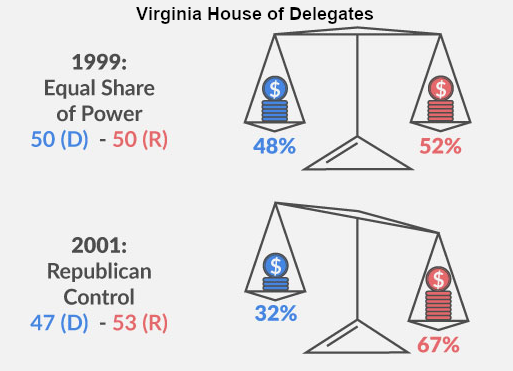
corporations shift their political contributions to support the party in power, able to alter legislation and administration of laws/regulations
Source: Virginia Public Access Project (VPAP), Historically, Money Has Followed Power
If political parties were businesses, then it might be possible to use Federal anti-trust laws to force a realignment to create more competition. Because the political parties are not regulated by the Federal Trade Commission, there are no requirements that barriers be low enough for third parties to have a fair chance to compete and to get candidates listed on the ballot.
Katherine Gehl and Michael Porter, co-authors of a Harvard Business School report, "Why Competition in the Politics Industry Is Failing America," argued that the two parties are happy to divide the market between them. They work together to block further competition. From their perspective, controlling the market - including candidates, contributions, lobbyists, data - is more important than delivering service to their customers.
Partisan gridlock is a business stimulant rather than a measure of business failure. The result of gridlock is an increase in revenue for political campaigns run by the two parties.
In a Freakonomics podcast interview, the Harvard Business School co-authors said:3
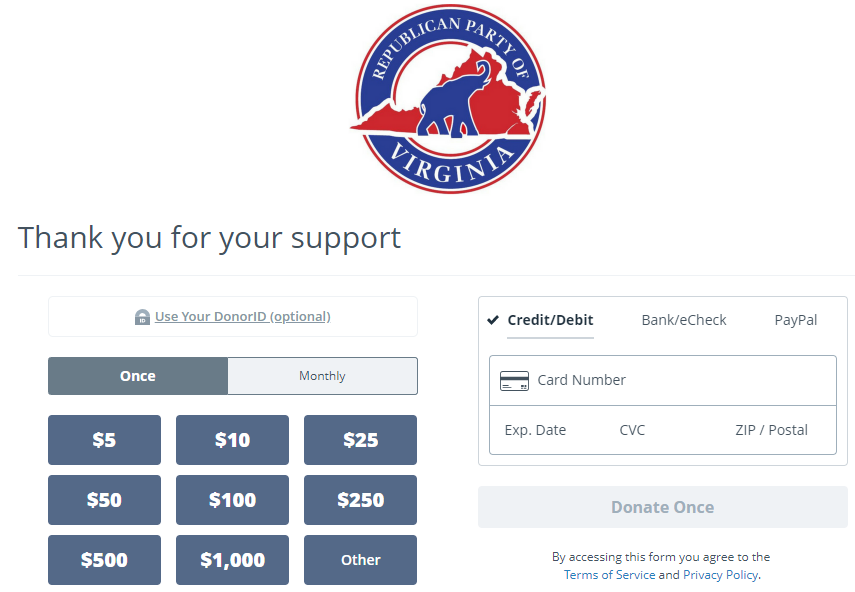
the Republican and Democratic political parties engage in constant fundraising
Source: Republican Party of Virginia
Independents have succeeded in getting elected occasionally in statewide elections. The most significant races in which an Independent was elected were in 1970 and 1976, when Senator Harry Byrd Jr. won re-election while avoiding being labeled as a Republican or as a Democrat. He is the only US Senator, so far, to win election and re-election as an Independent since ratification of the 17th Amendment in 1913 required direct election of Senators.
Henry Howell came close to victory in the 1973 race for governor, when he ran as an Independent, The Democratic Party nominated no candidate for governor that year, as the state parties re-aligned to match the national parties and conservative Democrats migrated to the Republican Party. Mills Godwin, a former governor who had been elected as a Democrat in 1965, won the 1973 race as a Republican. He too had wanted to run as an Independent in order to attract the traditionally-conservative Democratic voters, but Republican officials threatened to nominate their own candidate if he did not formally switch parties.4
In theory, all candidates for local School Board seats and for all Soil and Water Conservation Districts run as independents. Those races are supposed to be non-partisan, and the ballots for those offices do not list the political affiliation of the candidates. In practice, political parties endorse candidates in almost all races, and volunteers associated with the parties are key in getting out the vote for such low-turnout races.
In addition to the Democratic and Republican parties, there are other organized political parties who field candidates regularly in Virginia.
The Independent Greens of Virginia have pushed one particular transportation solution, "More Trains, Less Traffic!" Between 2005-15, the party ran one candidate for local, state, and Federal offices, Gail Parker. She identified herself as "Gail for Rail" and ran unsuccessfully for:5
2005 Virginia House of Delegates 44th District
2006 U.S. Senate
2007 Fairfax County Board of Supervisors, Chair
2008 U.S. Senate
2009 Virginia House of Delegates 44th District
2010 U.S. House of Representatives, 1st District
2011 Fairfax County Board of Supervisors, Mt. Vernon District
2012 U.S. House of Representatives 1st District
2013 Virginia House of Delegates 43rd District
2014 U.S. House of Representatives 1st District
2015 Fairfax County Board of Supervisors
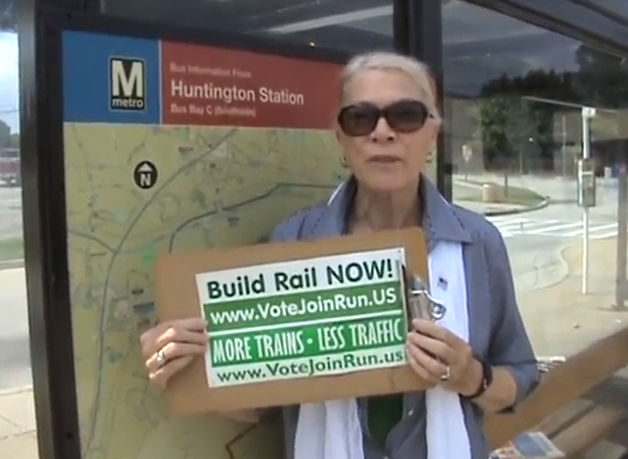
the Independent Greens of Virginia have nominated Gail for Rail Parker for multiple offices
Source: Green Party for Rail to Belvoir
The Libertarian Party was organized enough in 2008 to get eight candidates on the ballot in Virginia's 11 Congressional districts. To get those candidates into the races, the party had to collect 1,000 signatures from qualified voters in each Congressional District. That required having a sufficient number of volunteers, or sufficient funding to pay contractors, to collect valid signatures.
That third party earned 6.5% of the total vote in the 2013 race for governor of Virginia, but numbers then dropped to 2.4% in the 2014 Senate race and 1.1% in the 2017 governor's race. In 2018, it qualified candidates to run for the US Senate, in three districts for the US House of Representatives, and for Hampton City Council.6
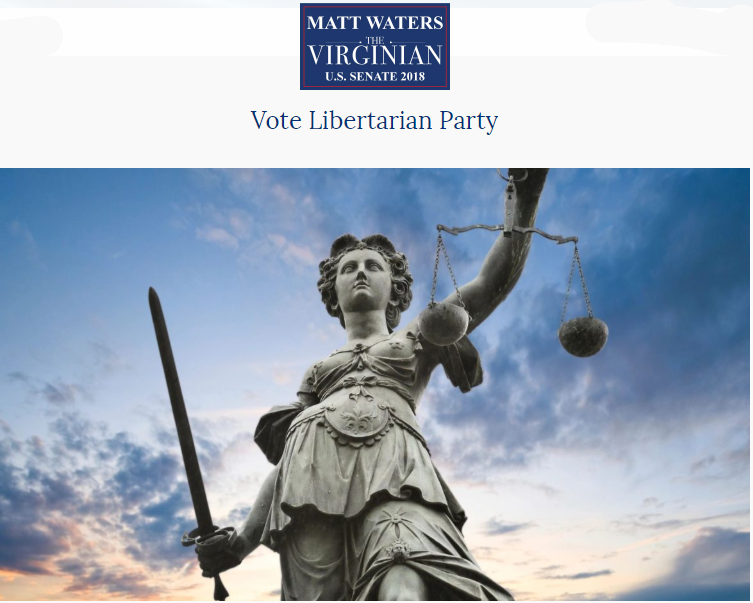
in 2018, the Libertarian Party candidate for US Senate was Matt Waters
Source: Matt Waters
In the 1965 race for governor, the Conservative Party candidate William J. Story attracted over 13% of the statewide vote and won 12 counties. His appeal was to segregationists, at a time when both the Democratic and Republican candidates were seeking support from black voters. The head of the American Nazi Party, George Lincoln Rockwell, also got on the ballot. His 5,000 votes were another reflection of the support for legal segregation at that time.
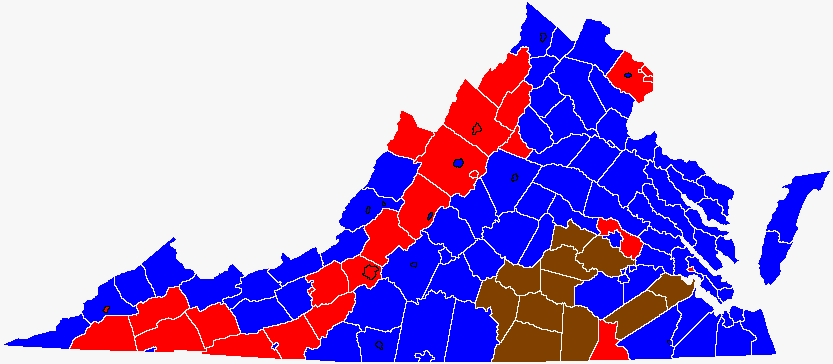
in the 1965 election, the third-party Conservative candidate won Southside counties (brown) and Mountain-Valley Republicans won western jurisdictions (red)
Source: Wikipedia, Virginia Gubernatorial Election, 1965
In 1969, the Conservative Party nominated candidates again for Governor, Lieutenant Governor, and Attorney General. They received less than 2% of the vote, in what turned out to be the last races for that party. Also in 1969, the American Independent Party associated with George Wallace ran a candidate for governor, while an individual (George R. Walker) also got his name on the ballot without associating with any party. Those two independent candidates received less than 1% of the vote.7
The Reform Party organized after H. Ross Perot ran for President in 1992, but has not gotten candidates onto the ballot. It has used its status to advocated for some policies, and unsuccessfully sought to draft former Senator Jim Webb to run as a Reform Party candidate in 2016.8
Collecting signatures is expensive and a drain on volunteers who might otherwise be generating support from voters. Nominees of some political parties are not required to complete the signature collection process. For the statewide offices of US Senate, Governor, Lieutenant Governor, and Attorney General, nominees not associated with a recognized political party must get 10,000 signatures, including at least 400 signatures from qualified voters in each of the 11 congressional districts.
The dream of a third party in Virginia to be considered as a "party" which does not need to collect signatures to get candidates on the ballot. The threshold to be a "party," as defined the Code of Virginia, is to earn 10% of the vote for a statewide office:9
Independent candidates not associated with any political party do have the option to get on the ballot. However, candidates never backed by a political party have a difficult time getting name recognition and rarely attract more than a smattering of votes. Virginia has yet to see a race where an extremely rich person self-funds an independent race for statewide office and wins. The 2021 race for Governor featured two wealthy men who contributed substantial sums to their campaigns, but they ran as candidates nominated officially by the Democratic and Republican parties.
A write-in candidate occasionally wins election to a local office, especially in cases where no one qualified for the ballot and the only way to fill the seat is with write-in votes. In 2019, no candidates submitted petitions to run in the Gloucester County School Board's Abingdon District. Two people then mounted write-in campaigns, but it was a friendly contest between them. The candidates said of each other:10
In 2019, incumbent Del. Nicholas J. Freitas failed to submit the paperwork required to get on the ballot for re-election to the 30th District of the House of Delegates. He was heavily favored in that district until fumbling key steps in reporting is nomination to the Virginia Department of Elections.
With the help of a $500,000 donation from a megadonor in Illinois who supported Republican candidates, he mounted a serious write-in effort. That included distributing pens with his name on it, educating voters not only on how to spell his name but also about the requirement to fill in the bubble next to the space on the ballot for writing in his name.
In 2014, Delegate Joseph Morrissey resigned from the General Assembly after being convicted of contributing to the delinquency of a minor. He had impregnated a a 17-year-old who was working as a receptionist at his law office, and later married her. Morrissey pled guilty and received a six month jail sentence.
The resignation triggered a special election for the House of Delegates seat. Morrissey chose to run for his old seat as an independent. He was spending nights in the Henrico County jail, but on the work-release program he was able to campaign for 12 hours/day. "Fighting Joe" Morrissey captured 42% of the vote. That was enough to defeat the Democratic and Republican candidates.
Democratic leaders in the General Assembly had called for Morrissey to resign, and considered expelling him after he was re-elected. In the end, no action was taked to even censure him. The resignation and re-election cost Morrissey his seniority in the House of Delegates and he lost respect of colleagues, but they accepted the decision of the voters and he continued to serve in the General Assembly. In 2019, he won the Democratic nomination and was elected to the State Senate.11
Back in 1989, one delegate was elected to the General Assembly by write-in votes.
That election occurred during a seven-month-old strike by coal miners in Southwestern Virginia against the Pittston coal company over pensions and medical benefits. The miners were particularly angry at the son of the incumbent delegate for the 4th District, which included Buchanan County and a part of Tazewell County. The son of Del. Donald A. McGlothlin Sr. was the Russell County Circuit Court judge imposing steep fines on the United Mine Workers union to ensure "property rights will be protected and the public safety will be protected" but also to bleed the union dry.
In response, the union sponsored a campaign by its local leader in the last three weeks of the campaign, Jackie Stump.
Del. Donald A. McGlothlin Sr. had support of the Democratic Party, which dominated Virginia politics at the time. He had been elected 12 times, was a committee chair in the House of Delegates, and was endorsed by US Representative Rick Boucher and House Speaker A.L. Philpott A. L. Phillpott. The challenger lacked a high school diploma and a smooth way of speaking, and his name was not on the ballot, but he was rich in door-to-door campaign volunteers. He also spent more money than the incumbent, primarily from donations by the United Mine Workers and other AFL-CIO unions. Local Republicans also supported him, seeing an opportunity to defeat a previously-popular Democrat.
Stump defeated the incumbent by a large margin, 7,981-3,812 votes, in 1989. He served in the General Assembly until retiring in 2005. The fines imposed by Judge Donald McGlothlin Jr. were overturned as excessively punitive, in a lawsuit that went all the way to the US Supreme Court.12
Source: You Tube, What Did You Learn in School Today? - Pete Seeger, Tom Paxton
Henry Howell was a populist who won the office of Lieutenant Governor in 1971 as an Independent. Howell had been defeated for the Democratic nomination for Governor in 1969. The primary inclded three Democrats, and none won a majority. In the run-off election, the more-conservative Bill Battle defeated Howell. Battle then lost to Republican candidate Linwood Holton; it was the first time since 1881 that a Democrat had not been elected Governor.
After Lieutenant Governor J. Sargeant Reynolds died from a brain tumor in 1971, Democratic Party oficials chose to nominate their andidate in a convention. Howell recognized he would be unable to win the nomination in the "smoke filled rooms" of that convention, so he ran in the special election as an Independent and won with 40% of the vote.
The two major parties were re-aligning at the state level to match the pattern at the national level. For nearly a century, the Democratic Party had been dominated by segregationists and fiscal conservatives such as Senator Harry Byrd Sr., but that shifted in the late 1960's. Republicans adopted a "southern strategy" to attract those voters, and Democratic candidate Hubert Humphrey got only 33% of the vote in Virginia when Richard Nixon was elected President in 1968. When Nixon was re-elected in 1972, the Democratic nominee, Sen. George McGovern, won only 30% of the vote in Virginia.
In 1973, at the end of Linwod Holton's term, Henry Howell chose to run as an Independent for Governor rather than associate himself with the national Democrats. Mills Godwin feared Howell might win another three-way statewide race, so he reluctantly joined the Republican Party. Howell lost as an Independent in 1973. After winning the Democratic nomination four years later, he was defeated again in 1977.13
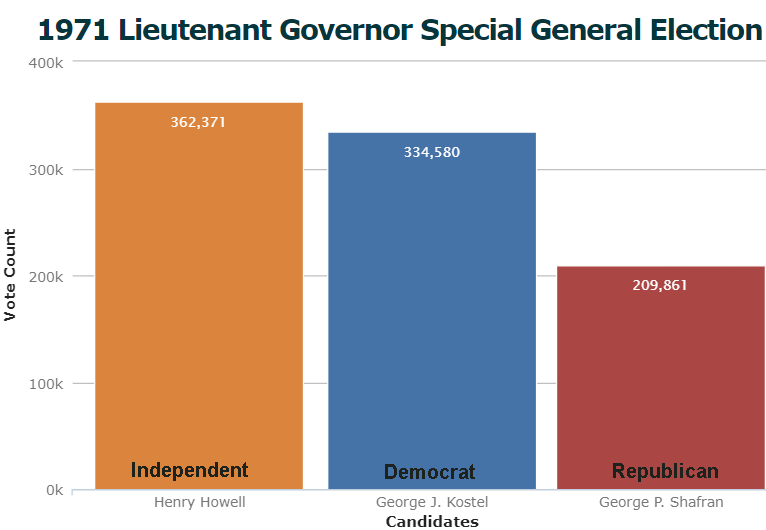
Henry Howell won the Lieutenant Governor's race in 1971 as an Independent
Source: Virginia Department of Elections, 1971 Lieutenant Governor Special General Election
Other than the success of Senator Harry Byrd Jr. and Henry Howell, the most significant impact of a statewide independent candidate was in 1994. Marshall Coleman pulled enough votes away from the Republican nominee for US Senate, Oliver North, to allow Sen. Chuck Robb to win re-election.
Senator Robb spent $5 million and got 45.6% of the vote as the Democratic Party nominee. Oliver North, as the Republican Party nominee, spent $18 million and got 42.9%. The spoiler in the race, Marshall Coleman, had been the Republican candidate for governor in 1981 and 1989 after as Attorney General in 1977-81. Coleman received 11.4% of the vote, primarily from Republicans who could not support Oliver North as the party's nominee.
Both Robb and North were damaged candidates in 1994. Robb's extramarital affairs allowed North to link him closely with President Bill Clinton, in a year when a wave election led by Newt Gingrich gave Republicans control of the US House of Representatives for the first time since 1956. North had been part of the Iran-Contra affair, though on appeal his felony conviction for telling lies to the US Congress while under oath was overturned.
Robb attacked North's character throughout the race, at one point labeling him as:14
Traditional Republican leaders, including Senator John W. Warner and former President Ronald Reagan, refused to support North. Nancy Reagan's condemnation twelve days before election day was seen by pundits as the turning point in the race. Republicans who intended to vote in their district's US House of Representatives race that year, but could not support Oliver North for the US Senate, had the option of voting for a well-known Republican who did not happen to be the official nominee of the Republican Party.
Marshall Coleman argued that a vote for him would not be a wasted vote, which is the standard argument against independent and third-party candidates. He claimed a vote for him would be a principled vote:15
Source: You Tube
Independents have more success getting elected to local rather than statewide offices. Candidates are know personally by a higher percentage of the voters, and in local races the ballot does not list candidates by political party. Ballots for local offices list candidates in the order they submitted their paperwork. When a group of candidates affiliated with a political party submit their paperwork together, then a random draw determines the order in which they will appear on the ballot.
Having the support of a political party helps speed up the process of getting the signatures required for candidate petitions. Candidates who file first get an advantage because they are listed at the top of the ballot. The order makes a difference; candidates at the top get about 10% more votes.16
In August 2017, white racists marched through Charlottesville chanting slogans such as "White Lives Matter and Jews Will Not Replace Us!" One counter-protestor died, and the event became a national flashpoint to discuss how to respond to the rise of the alt-right. City officials failed to ensure separation between protesters and counterprotesters. Police were unprepared for the violence, and the City Council complicated and confused their response.
The following November, frustration at the inadequate government response led to the election of the first independent to City Council since 1948. Nikuyah Walker called for dramatic change rather than maintaining the illusion that the status quo was acceptable, challenged the all-Democratic City Council to address systemic racism and economic inequality, and won the most votes in the local election. City Council then chose her to be the next mayor, passing over the other candidate who had served the longest on the council.
Charlottesville was a one-party town; the last Republican had been elected to city council in 2002. A year after her election, Mayor Walker emphasized her independence from the liberal progressive Democratic structure in a newspaper interview:17
In certain cases the independence of candidates is highly questionable. In 2018, two races demonstrated how political partisans can try to siphon votes away from an opponent by assisting a so-called independent candidate.
In the Second Congressional District, the incumbent Republican Rep. Scott Taylor anticipated a close race for re-election. After the Democratic primary, his staff assisted the losing candidate, Shaun Brown, in an effort to get her on the ballot as a independent. The hope was that Democratic voters would split their votes between the party nominee and the "independent" Shaun Brown. Dividing the Democrats might allow the Republican to win, with perhaps less than 50% of the total vote but more than either opponent.
Shaun Brown had been the official Democratic candidate in 2016, and she lost that election by 23 points. In 2018, Elaine Luria defeated her in the Democratic primary, but Shaun Brown still had broad name recognition as a Democrat. Staffers working for the Republican candidate helped her gather the 1,000 signatures needed to get her name on the 2018 ballot as an independent.
The plan backfired because the public radio station WHRO and then The Virginian-Pilot examined the petitions submitted to the Virginia Department of Elections. They found forged signatures, including those of four dead people. In response to a lawsuit filed by the Democratic Party of Virginia, a Richmond Circuit Court judge ruled the petitions to get Shaun Brown on the ballot as an independent were invalid. The judge declared the petitions were "out and out fraud" and blocked her from being listed on the ballot as a candidate in the Second Congressional District.

a judge invalidated all of the petitions with signatures to get the "independent" Congressional candidate on the ballot in 2018
Source: Scribd, Democratic Party of Virginia v. Piper
In the general election, the Democratic candidate Elaine Luria won. The Republican Rep. Scott Taylor got 48.82% of the vote, while his one opponent - the Democratic nominee - got 51.04%. Her margin of victory was 6,050 votes. If the Republican plan had succeeded and 5% of the Democrats had voted for the "independent," then Rep. Scott Taylor would have been re-elected rather than defeated.
A special prosecutor ultimately determined that there was no collusion by the Taylor campaign to recruit a third-party candidate and it was legal to circulate petitions on behalf of a third party, but forging signatures was a violation of state law.
The special prosecutor found no evidence that the congressman was directly involved, but in May, 2019 he filed felony charges against one of Rep. Scott Taylor's campaign staffers. She later negotiated a plea deal and pled guilty to a misdemeanor. She had certified that she had witnessed the signing of the petitions, but in fact had submitted two pages that were collected by others. She claimed she was not responsible for the forgeries, but accepted a one-year suspended jail sentence and $2,500 fine for her "willful neglect of an election duty."
During the 2018 campaign, Democrats linked Rep. Taylor to the scandal throughout the campaign, and right after the 2018 election the special prosecutor commented on the pace of his investigation:18
A Democratic operative was more successful in 2018, siphoning perhaps enough votes from a Republican candidate to flip an election.
Three candidates were listed on the ballot for chair of the Prince William County School Board. Though the seats on the School Board are theoretically non-partisan and ballots do not identify the party affiliations of candidates, the Republicans endorsed one candidate and the Democrats endorsed another. A third candidate, Stanley Bender, received no endorsement from either party and hardly campaigned.
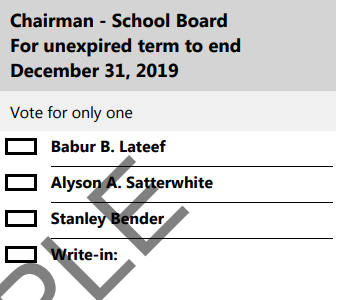
in the 2018 School Board race in Prince William, party affiliations were not listed next to names of the three candidates
Source: Prince William County, Sample Ballot (November 6, 2018)
The Democratic candidate defeated the Republican candidate by 10,043 votes. The third person on the ballot, Stanley Bender, received 14,351 votes - almost 10% of the total. His vote total may have been due to a last-minute effort by the former chair of the county's Democratic Party. That operative created a political action committee (PAC) after the last date to report campaign contributions before the election, then had "Republicans For Stanley Bender" signs posted at polling places.
That school board race had received little media coverage, and a significant number of Republican voters were probably unaware that Stanley Bender was not the officially-endorsed candidate. He raised only $100 and spent none of it. In contrast, the Democratic candidate spent $90,000 and the Republican candidate spent $14,000.
On election day, the "Republicans For Stanley Bender" signs were a surprise. Because they were posted by a legitimate, registered political action committee, the outraged Prince William Republican Party could not legally remove any of the signs that day. The Republican Party later claimed that the candidate had not authorized the committee and called for an investigation by the State Board of Elections, but that occurred after the vote was certified.
The last-minute sign campaign was designed to split the Republican vote. Getting Republican supporters to vote for a third candidate, not the person actually running with Republican Party support, may have enabled the Democratic candidate to win with less than 50% of the total vote. However, that third-party candidate got 10% of the absentee vote, suggesting that the election-day signs may not have increased his share of the vote significantly.
Three weeks after the election, the local Commonwealth's Attorney announced that a special prosecutor would investigate the political action committee for a criminal offense. The Prince William Commonwealth's Attorney had a close relationship with the individual responsible for placing the signs, who had been chair of the county's Democratic Party committee. A special prosecutor from Loudoun was chosen to pursue the criminal case.
The Virginia Board of Elections has no authority to deal with a criminal offense, but it does have authority to punish for civil offenses. It imposed a $500 fine on the Republicans For Stanley Bender Political Action Committee, because it used the candidate's name without authorization and failed to report its spending within 24 hours.19
In 2020, rapper-producer Kanye West collected enough signatures to get on the Virginia ballot as a candidate for President of the United States. He had announced plans to run in 2015, but had articulated no clear policy objectives until 2020. Political commentators noted that he received logistical support from President Trump's supporters to get on the ballot as a member of the Birthday Party (because "when we win, it's everybody's birthday"), and speculated that his campaign was designed primarily to pull votes away from Democratic candidate Joe Biden.
If West won the popular vote in Virginia that year, 13 Virginia electors would cast votes for him as members of the Electoral College. However, over half of the 13 electors identified on West's registration claimed they were unaware of their status. The Trump campaign denied having organized the Kanye West campaign. Direct logistical support for a third-party candidate might violate Federal election laws, since the money spent by West to attract pro-Biden voters might qualify as an unreported contribution to the Trump campaign.
The issue became moot after a judge overruled the Virginia Department of Elections and blocked West from being listed as a Birthday Party candidate for president on the November 2020 ballot. The Richmond Circuit Court decided that the oaths taken by some electors were invalid, and that 11 of the 13 had not been obtained or notarized properly.
Those jurisdictions which had already printed ballots including Kanye West's name were not required to throw them away, but did have to post notices at polling places and online that he had been disqualified. Voters in Caroline County saw Kanye West's name on the ballot, but the Virginia Department of Elections decided not to report the total number of votes for him statewide.20
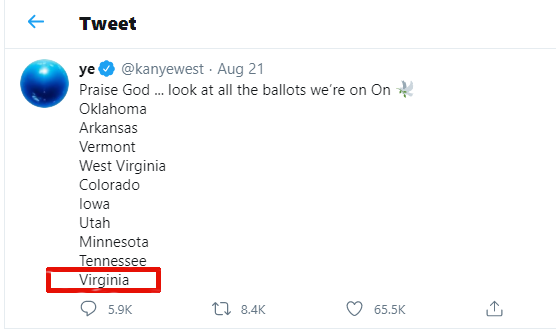
Kanye West tweeted in August, 2020 that he was on the ballot in Virginia, but later was removed because of fraud
Source: Kanye West, @kanyewest
Independent candidates are, at times, members of a political party who recognize they can not win the party's nomination but think they might win the general election, especially if the other political party declines a nominate anyone. The 2019 race for the State Senate's 40th District seat included an Independent candidate for that reason.
In 2019, State Senator Bill Carrico (R-40th District) waited until after the deadline to file for the Republican nomination before announcing he would retire. The deadline to file passed before the general public knew that the popular incumbent would not run for re-election.
Many legislators wait until after the General Assembly session ends before announcing their plans to retire from the House of Delegates or State Senate, but the timing of the announcement is typically made before the deadline for candidates to file. Some incumbents do alert their preferred successor first before making a public announcement, giving that person extra time to line up endorsements, funding, and other support for their campaign in November.
Two people found out about the State Senator's plans and managed to file the paperwork required to get the Republican nomination. One of those people claimed that the retirement announcement had been timed so Sen. Carrico could collude with his desired successor, and have him be the only qualified candidate for the Republican nomination. In the 40th District, the Republican nomination was tantamount to election. Sen. Carrico ran unopposed in 2015, and won 67% of the vote in 2011. In 2019, the Virginia Public Access Project rated it 75% Republican.
The plan leaked, however. The second person beat the deadline by 30 minutes, before Sen. Carrico made his retirement announcement 30 minutes after the deadline.
Because there were two candidates, the Republican Party then scheduled a mass meeting to pick a nominee. State Senator Carrico's preferred candidate was already a member of the General Assembly, serving in the House of Delegates. Del. Todd Pillion had been elected first in 2014, and other party leaders quickly endorsed him. The candidate who had learned through a tip of Sen. Carrico's retirement plans was the director of the Community & Economic Development Department in the town of Marion, and had never been elected to public office in the area.
He decided before the mass meeting to abandon plans to run as a Republican,. He chose instead to collect 250 signatures on a petition and file as an Independent.
Running as an Independent instead of seeking the Republican nomination ensured he would get on the ballot in the general election, since he viewed the mass meeting as a planned coronation for the pre-selected candidate. Choosing to be an Independent also ensured that voters would have a choice in November, even if the Democratic Party could not recruit a candidate to run for that State Senate seat. Since 1995, the Democratic Party had nominated a candidate just once.
Choosing to run as an Independent ended up unsuccessful, but allowed the candidate to declare to voters:21
The Hatch Act blocks Federal employees from running for office except as independent candidates. The effect on potential candidates is strongest in Northern Virginia, with its concentration of Federal employees. Prince William County's last independent supervisor, Terry Spillane, was a Federal employee who was "Hatched" util he chose not to run for re-election in 2003.
In 2020, an Arlington County candidate sought the Democratic nomination for School Board. School Board races are officially non-partisan, so on the ballot no candidate is identified as a Democrat, Republican, or Independent, but the political parties still endorse School Board candidates and campaign for them.
A rival highlighted that the candidate was a Federal employee. She had received clearance from her employer that her run was compliant with the Hatch Act, which makes exceptions for certain races in areas with high Federal employment, but she shifted strategy and chose to run as an independent. A Democratic Party official became her campaign manager for the independent candidate, supporting a "lifelong Democrat" who was running against two candidates endorsed by both the Republican and Democratic parties. The campaign manager was forced out of her position as precinct captain for the Arlington County Democratic Committee.
The chair of the Arlington County Democratic Committee explained:22
Both parties struggle to comply with party rules that prohibit supporting candidates running against those nominated by the party. In 2020, in a race for multiple eats on the city council in Harrisonburg, the Rockingham County Republican Party nominated one candidate but contributed funding to only an independent. State Senator Mark Obenshain and Delegate Tony Wilt, two influential Republicans from the area serving in the General Assembly, also contributed to the independent.
A local activist objected, claiming that under party rules party leaders who supported a candidate in opposition to a Republican nominee should be banned from participation in party actions for four years, and "deemed to have resigned his Committee position." The activist had been expelled from the party in 2014 for that reason. Not surprisingly, there was no action taken by the state or local committees. The rationale used was that there were multiple seats to be filled in the city council election and only one Republican candidate, so assisting an independent did not constitute opposing the Republican.23
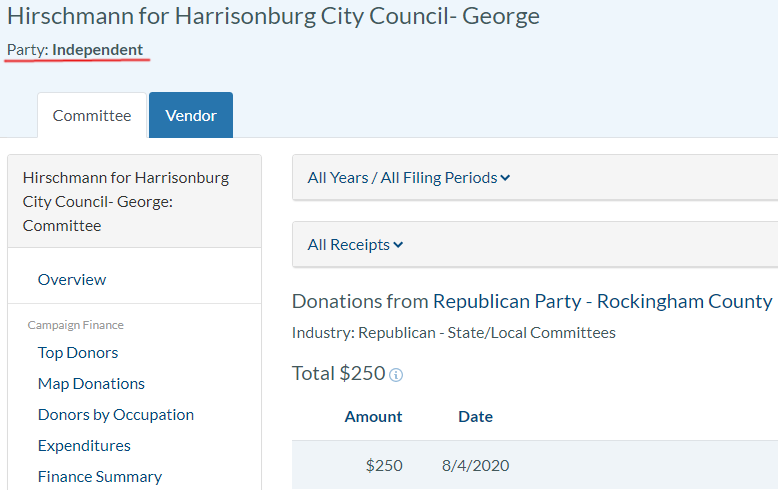
the local Republican Party unit contributed to an independent candidate in the 2020 race for city council in Harrisonburg
Source: Virginia Public Access Project (VPAP), Hirschmann for Harrisonburg City Council- George
The challenge of running as an Independent caused a candidate for governor to reverse course in 2020. State Senator Amanda Chase had announced plans to seek the Republican nomination for governor in 2021, to advance essentially the same agenda as President Trump. Party officials considered her too extreme, especially after Trump lost Virginia by 55-45 in 2020. The State Central Committee decided to nominate candidates through a convention rather than primary, a technique expected to enhance the prospects of more-moderate candidates such as Del. Kirk Cox. Chase had already been dropped from all committee assignments in the State Senate by the Republican leadership.
Chase reacted by declaring she would seek nomination as an Independent, but a week later reversed course and prepared to compete in the convention. She claimed concerns about splitting the Republican vote and electing a Democrat in 2021, but the odds were low of winning statewide office without party affiliation in a time of hyper-partisanship.
The last candidate to do so was Sen. Harry F. Byrd Jr. in 1970 and 1976. At that time, the Republican and Democratic parties at the state were switching political stances to align with the national parties, and partisan identification was in flux.24
In 2021, State Senator Amanda Chase chose to support the official Republican Party nominee in the race for governor; she did not run as an independent. The Democratic Party ended up worrying about a third-party candidate, Princess Blanding. She gathered enough signatures and qualified for the ballot as the nominee of the Liberation Party.
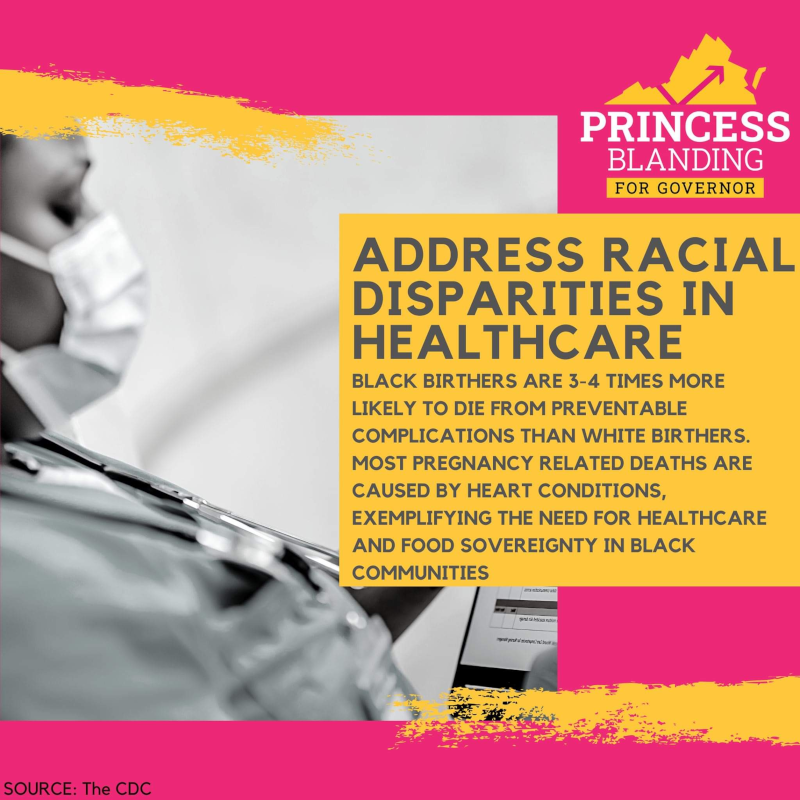
Princess Blanding targeted her third-party campaign in 2021 to black voters, who traditionally had supported Democratic candidates
Source: Facebook, Princess Blanding for Governor
A group totally unconnected to Princess Blanding distributed mailers in her support at the end of the campaign. Democrats feared that in the tight race, she might get 1% of the vote and would peel away enough support from Terry McAuliffe to tilt the election to the Republican candidate, Glenn Youngkin. The tactic drew national attention, and Politico reported:25
It was the second race for McAuliffe in which a third party candidate was a factor. In 2013, he defeated Republican Ken Cuccinelli by 47.7%-45.2%. Libertarian Richard Sarvis won 6.5% of the vote. Had the Libertarian candidate not been in the race, then more of his voters may have chosen Cuccinelli and tipped the election to the Republicans. On the other hand, those Libertarian voters might have chosen not to cast a ballot, or might have split roughly equally between the Democratic and Republican candidates.
After the election, it became clear that a longtime GOP operative was the treasurer of the group funding mailers for Blamding. She captured 0.70% of the vote in 2021, which Republican Glenn Youngkin won with 50.57%. Had all 23,125 votes for Blanding gone instead to Terry McAuliffe, the Democratic candidate would still have fallen short by 40,000 votes.26
Voters rather than the General Assembly began choosing governors in 1851. Having more than two candidates on the ballot is normal. In the 42 elections between 1851-2021, 60% had three or more candidates.
In 1965, William Story captured 13% of the vote, the most ever for a candidate not nominated by a major party. He was a segregationist running on the Conservative Party ticket, at a time when white Virginians were reacting against forced school desegregation. In the same election, George Lincoln Rockwell won 1.2% of the vote while running as the candidate for the American Nazi Party.
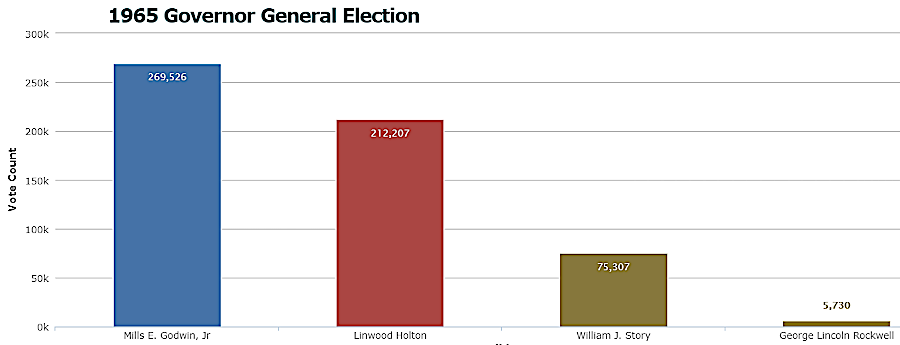
the most successful third-party candidate, William Story running on the Conservative Party ticket, won 13% of the vote in 1965
Source: Virginia Department of Elections, Historical Elections Database
As a result of the sucess of third-party candidates, Mills Godwin won the 1965 election with 47.5% of the vote. He became the second governor elected with less than a 50% majority, if you count William "Extra Billy" Smith's victory in 1863 as the Confederate governor of the state. (Counting the 1863 race, in 2013 McAuliffe became the third governor elected without 50% of the vote.)
During the Civil War, Smith won with 48.1% of the vote counted from Confederate-controlled jurisdictions. The General Assembly certified his election, though the records from Pittsylvania and Prince George counties were lost between the election and the certification.
Smith was supposed to serve a four-year term, but his term terminated in May 1865 after the defeat of the Confederacy. Smith was replaced by the governor who had been elected in Union-controlled parts of Virginia in 1863, Francis Harrison Pierpont. Pierpont had captured 100% of the vote, but from just a small percentage of the state. His total of 3,755 votes was less than the votes for any of the top three candidates in the Confederate election. William "Extra Billy" Smith won 28,613, Thomas S. Flournoy won 23,453 votes, and George W. Munford won 7,478 votes.
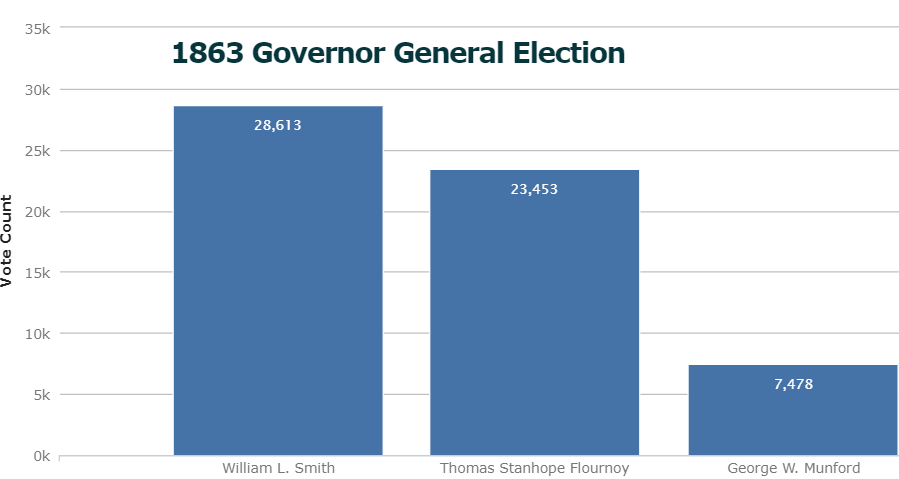
the first governor to be elected without at least 50% of the vote was William "Extra Billy" Smith in 1863, as the Confederate governor of Virginia
Source: Virginia Department of Elections, Historical Elections Database
Dwanye Yancey in Cardinal News has reported:27
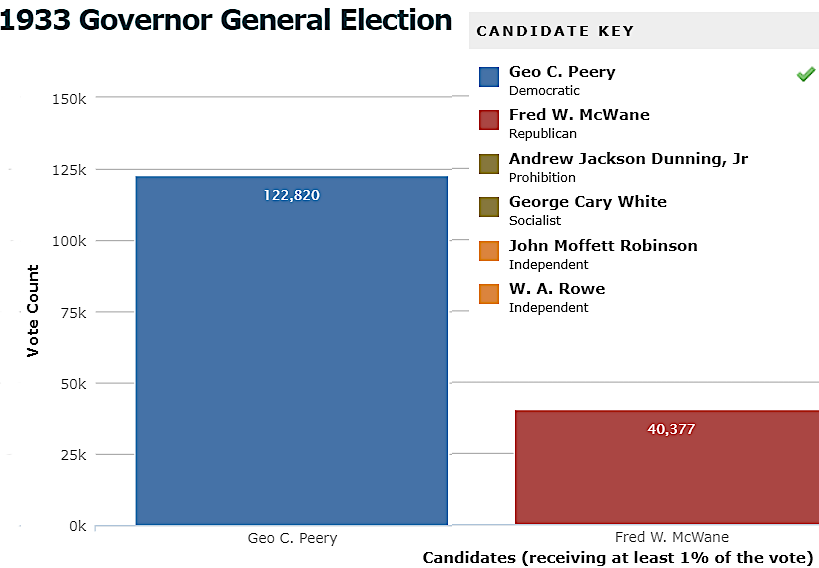
in 1933, there were six candidates on the ballot in the race for governor
Source: Virginia Department of Elections, Historical Elections Database
Party affiliation affects committee assignments at the General Assembly. When Sen. Chase resigned from the Republican caucus in 2019, she was stripped of her assignments to significant committees. The entire Republican caucus voted for her removal from her last assignment, on the Local Government Committee, at the start of the 2021 session. That action came after she had attended President Trump's rally on January 6, 2021 which led to the storming of the US Capitol, and she continued to challenge the legitimacy of Joseph Biden's election as president.28
She was censured by the entire State Senate at the end of January, 2021 in a 24-9 vote. All 21 Democrats and three Republicans voted for censure, including the Senate Minority Leader. His election to that position in 2020 had triggered Chase's resignation from the Republican caucus. It was the first censure in the State Senate since 1987, when a member was censured for voting on bills in which he had a financial interest. That member, who also suffered from serious cancer in 1987, then chose not to run for re-election.
Censure strips a member of the General Assembly of their seniority, making them last in line for allocation of office space and seating within the chamber. Chase ended up claiming she was a Republican, but receiving no benefits from her party affiliation. She did avoid the greatest punishment under the Constitution of Virginia, one that has never been used (emphasis added):29
Legislators elected as independents can serve in key roles if they choose to caucus with one of the two parties. One of the most important independents in modern times was Lacey Putney from Bedford County. He served 52 years in the House of Delegates, and was the longest-serving legislator in Virginia history when he retired in 2013. He was elected in 1961 and 1963 as a Democrat, running unopposed at a time when Harry F. Byrd's "organization" still controlled state politics. He faced a Republican opponent in 1965, and switched to run as an Independent in the 1967 election. For 42 of them, he identified as an "independent."
In 1998, he began to caucus with the Republican Party. That created a 50-50 tie in the House of Delegates. The two parties negotiated a power sharing agreement that left the Democratic Speaker in place. The Speaker appoints all members of all committees in the House, and he retaliated in 1998 against Del. Putney by refusing to appoint him as the Republican member of the conference committee to negotiate the final state budget. Two Republicans with much less seniority were given that coveted assignment.
Republicans gained control of the House of Delegates in the 1999 elections, and a Republican served as Speaker of the House for the rest of Putney's career. Elected as an independent, but caucusing with the Republicans, Putney was chosen to serve as Co-Chair and Chair of the of the Privileges and Elections Committee (1998-2007), Chair of the House Appropriations Committee (2008-2013), and briefly as Speaker of the House in 2003.30
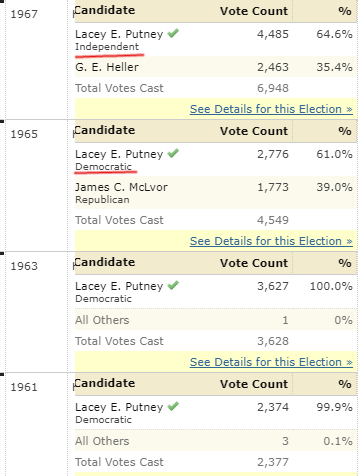
Lacey Putney won election as an Independent candidate beginning in 1967
Source: Virginia Department of Elections, Lacey E. Putney (I)
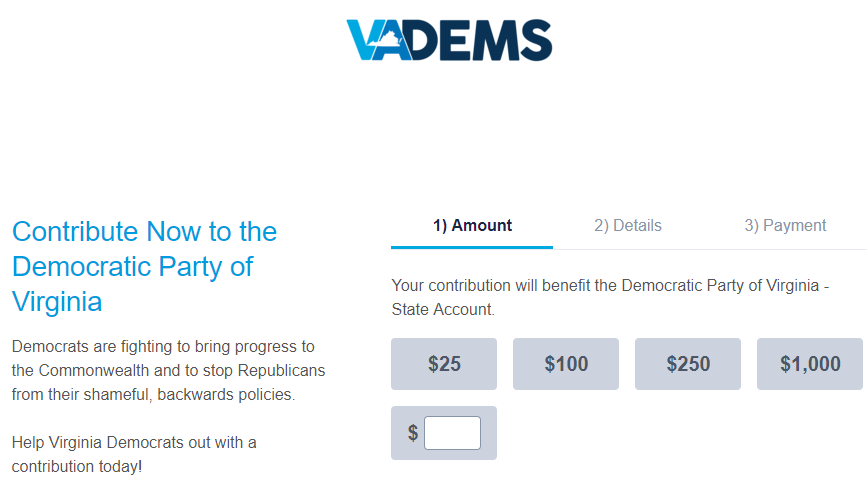
the two dominant political parties in Virginia collect the vast majority of campaign contributions
Source: Virginia Democratic Party